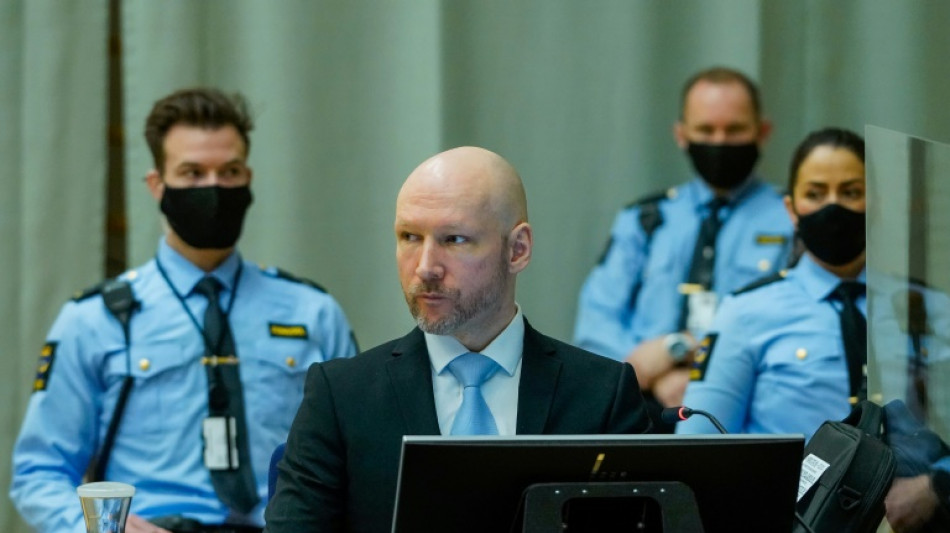

Release Breivik? Norway court hears closing arguments
Prosecution and defence lawyers presented their closing arguments on Thursday to a Norwegian court which will now decide whether to parole Anders Behring Breivik, just 10 years after the neo-Nazi committed the country's deadliest peacetime attack.
Breivik, who killed 77 people in twin attacks in 2011, claims he has distanced himself from violence and wants to be paroled after serving the minimum court-ordered 10 years of his 21-year sentence. His jail term can be extended for as long as he is considered a threat to society.
Prosecutor Hulda Karlsdottir called his parole request a "PR stunt" and argued that 42-year-old Breivik, who a psychiatrist and prison officials said was still extremely dangerous, should remain behind bars.
The defence meanwhile used the opportunity to ask for an easing of Breivik's prison conditions to facilitate his future reintegration into society.
Breivik's request for early release is widely expected to be denied.
On July 22, 2011, the right-wing extremist set off a truck bomb near the government offices in Oslo, killing eight people, before heading to the island of Utoya where, disguised as a police officer, he gunned down 69 others, mostly teens, attending a Labour Party youth wing summer camp.
He said he killed his victims because they embraced multiculturalism.
Speaking before the court earlier this week, Breivik gave his "word" that he had renounced violence -- which he said was the result of his "brainwashing" -- and said he now wanted to work for the neo-Nazi movement in a non-violent manner.
"The Breivik who is asking us to trust him is the same Breivik who destroyed the government offices and called it a fiasco", prosecutor Karlsdottir said in her closing arguments.
- Publicity stunt -
"He's the same criminal who drew youths on Utoya toward him, tricking them into thinking they would get help, and then fired on them", she told the district court for the southern district of Telemark.
The court's three-day hearing was held for security reasons in the gymnasium of the Skien prison where Breivik is incarcerated.
Karlsdottir echoed criticism from the families of victims, survivors and experts this week, saying Breivik's parole hearing was just a "PR stunt" aimed at improving his prison conditions and an opportunity for him to reach out to people who share his views.
"He thrives on this publicity. He's beaming. I find this hard to watch in a case like this", Karlsdottir said.
In the manifesto he published online just before carrying out his attacks, Breivik wrote that court proceedings should be used to spread propaganda.
Throughout his hearing, which began on Tuesday, he greeted the judges with Nazi salutes and held long ideological tirades on "white supremacy" and "culture wars".
His defence lawyer formally submitted a request for his early release but appeared to acknowledge that was unlikely, spending most of his closing argument calling for an easing of Breivik's isolation.
- No exceptions to the law -
Breivik is held apart from other inmates, with visits and contacts to the outside world heavily restricted to prevent him from building networks capable of carrying out new attacks.
His lawyer, Oystein Storrvik, argued this was counter-productive. "If you want to reduce the risk of recidivism, you have to allow contact with other people."
Storrvik said this was a necessary condition for rehabilitation and future reintegration into society, which is the main goal of the Norwegian prison system.
"It's a paradox if a person is so poorly treated in prison that he has no chance of rehabilitation and thereby no chance of being released," he said.
The parole hearing has been seen as a test of Norway's rule of law and has reopened old wounds.
"Personally I think he should be held for 21 years times 77, and even longer", said the head of the support group for the families of the victims, Lisbeth Kristine Royneland.
"But you can't change the Norwegian legal system. We just have to treat him like an ordinary prisoner and not make any exceptions to the law, because that would just give him even more attention", Royneland, who lost her 18-year-old daughter on Utoya, told AFP.
The court's decision is expected within the next three weeks, chief judge Dag Bjorvik said as proceedings wrapped up.
If parole is denied, Breivik will in theory be eligible to apply again after one year.
F.Laguardia--IM




